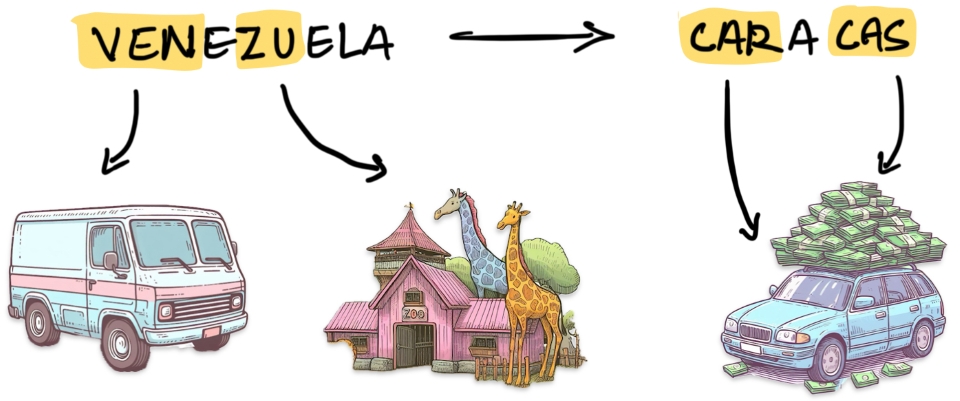Table of Contents

1 Introduction
Have you come across a new word that you had to memorise? And you went on reciting it several times, day after day to memorise that word? Even after such strenuous effort, you forget that after some time. We all constantly face it and find it difficult to memorise abstract words.
Abstract information does not easily stick to our minds for longer period. Contrary to this, we easily remember concrete words or information such as bits from our favourite movies. A fact we have been told a thousand times, and it is NOT WRONG. But the question is – how can we apply this to our studies? How to apply and where to apply?
In this article, we will know the rationale behind the fact and learn how we can exploit this to our advantage.
2 What you MUST KNOW.
Before we go about learning any method, you must know how the process of memorising works.
When we come across new information, it stays in our mind for a very short time (an hour or may be a day), termed as Short-Term Memory (STM). e.g., phone numbers, names of places etc. Recalling and revisiting this information again and again pushes it to our Long-Term Memory (LTM). e.g., alphabets of your mother language. Recall your childhood days when you had to recite it day after day.
If you never revisit the information in your Short-Term Memory, it will be lost after some time.
Coming back to our question as to why we remember movies but face difficulty in remembering any random word or information, we must know a few scientific facts about our minds –
- We tend to easily remember things/information that make an association with the information we already have in our mind (in LTM). This happens inadvertently when we watch a movie.
- We remember events from movie because the events are entertaining and engaging, which captures our attention and interest. Moreover, the events are presented as a story where one event links to another (making association) in a coherent way. Our mind likes and remembers if something is coherent and meaningful.
We can use this fact to trick our mind to remember abstract information by converting it into a coherent story. This is where Memory methods or Mnemonics come in. Any Memory trick, method (or Mnemonics) helps in converting abstract information into a coherent story consisting of events that we are already familiar with. It does two things:
- It helps in making association. The mnemonics is made of information you already know. And it points to the new information you want to remember thus creating a link. The stronger the association, the longer your mind remembers.
- It assists you in strengthening your Short-Term Memory because of the strong association established. That is, it improves retention time of your Short-Term Memory.
3 What you MUST DO (to memorise)
Let’s put together all the facts we have learned so far and apply them with an example.
Consider a country-capital pair that we need to memorise: VENEZUELA with capital CARACAS. To memorise this, traditionally we recite it several times and revisit it again and again for several days, just like we did for alphabets. The problem here is that we perceive this info in complete isolation. We think it as a standalone word and believe that reciting is the only way to imbibe it in our brain. It works but it’s cumbersome and takes time.
Instead, what we must do is – break this word into something we already know and make up a story that makes sense to us.
- VENEZUELA can be broken into: VEN e ZU ela. Here, VEN sounds like ‘van’ and ZU sounds like ‘zoo’.
- CARACAS into: CAR a CAS. Here, CAR is just a ‘car’ and CAS sounds like ‘cash’.
With these fragmented words we can create a story which will stick to our brain. Do not bother yourself about the letters (in lower case) that I have ignored while breaking up both words. Your mind is smart enough to discard it once you make up the story with words in upper case. Now let’s make up a story –
Imagine a Van in a Zoo at midnight. The Van is full of different kinds of animals. Some people are attempting to smuggle these zoo animals. A Car, which is full of Cash, comes and stops in front of the Van. This Animal-for-cash deal is taking place but suddenly a siren goes off and they get surrounded by police.

Let’s go over the original words and the story. VENEZUELA becomes Van in Zoo, and CARACAS becomes Car full of Cash. Here we have broken up the words (VENEZUELA, CARACAS) into something we already know (Van, Zoo, Car, Cash), made up a story linking these words which will help us remember the original words.
Go through the story a few times and make a visual picture in your mind. You can go with this story or make up any other which makes sense to you. Now, whenever you come across VENEZUELA, a VAN and ZOO will pop in your head and CARaCAS will follow automatically.
This is the simplest, yet effective, way of memorising words. Some people interpret new information or words this way intuitively, while most are just unaware of it. This article is for the latter.
4 What you MAY FEEL
In the beginning, it may sound ridiculous while attempting the above exercise. Your mind may respond in two ways:
Firstly, you may feel that breaking up words and making up stories is too much work, time-consuming or even boring. But its normal if you have just started. You may end up spending more time just to find a familiar word while breaking up the original words. Hence your mind will resist this and compel you to give up. Nevertheless, DO NOT give up.
This exercise is forcing your mind to do something it has never done before, so its natural it will resist. However, after some time your mind will adapt to perceiving information this way and it will become natural. It’s like teaching your mind a coded language. In the beginning you may face difficulties, but later It will benefit you for the rest of your life.
Secondly, once you have made an interesting story, you may feel in excitement that you will never forget the story and the linked information. You COULD NOT BE MORE WRONG. Don’t get carried away with this false sense of knowing. This memory method (or any other) has only extended retention time of your STM. It still needs to traverse to your LTM by repetition (revision).
Without this method, you may need to revisit it every day to remember. But with the story, you don’t need to revisit every day. No matter what methods or mnemonics you use for remembering things, you cannot skip ‘revisiting/recalling’ if you want it to be placed in your Long-Term Memory. In other words, Tricks/Mnemonics will decrease the revisiting frequency significantly, and it will require less revisits to make the information permanent.
5 Where you CAN APPLY
Now that you know how to go about memorising new words, the next question arises – where exactly can this method be applied in studies?
Well, this method can be applied wherever we need to remember a pair. In fact, it’s not limited to a pair of words. It can be applied to any number of words that you have to memorise. Only thing you need to do is, link all words with a coherent story. To get you started, here are some examples:
- Country-Capital (discussed above)
- Country-Capital-Currency
- Book-author
- Inventor-Invention
- Historical event-prominent figure
- Place-River/Important sites
So, only limit to the application of this method is – your imagination.
This is the most basic method to memorise new words or phrases. It also serves as a cornerstone for enhancing your memory skills which you will learn on this blog in future.
See you in the next one 👋.


